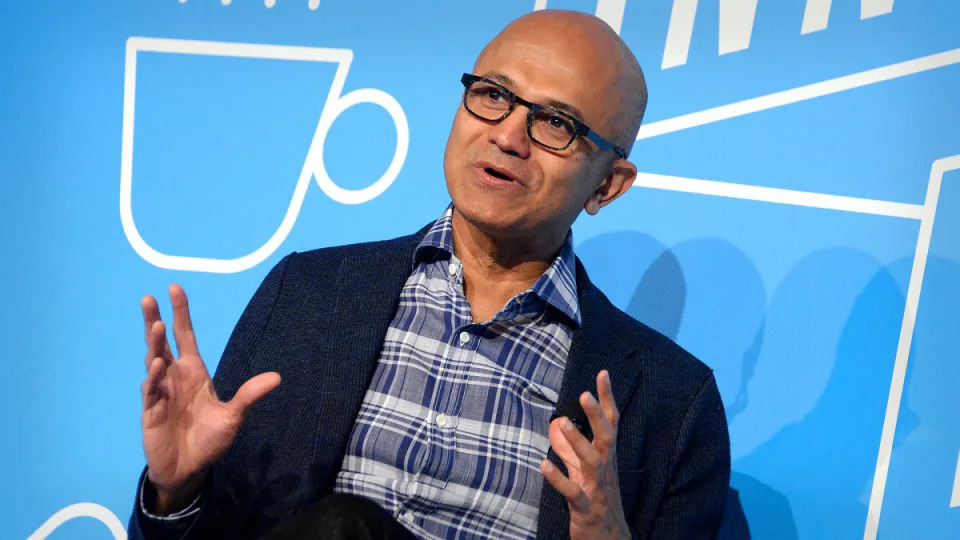Analyst revisits Microsoft stock price target amid AI spending ramp
Microsoft shares edged lower in early Friday trading, but remain on pace for a solid weekly gain, after a top Wall Street analyst revisited the tech giant's rating and price target following its muted quarterly earnings earlier this month.
Microsoft ( MSFT ) , which has been the second-worst performer of the so-called Magnificent 7 stocks so far this year, disappointed Wall Street with plans to expand its capital spending on AI infrastructure even as growth in its flagship cloud division continued to moderate.
The group's Azure cloud division, its biggest growth driver, posted revenue growth of 29% for the three months ended in June, just shy of Wall Street's 30% forecast. Overall Intelligent Cloud revenue rose 19% to $28.52 billion, also narrowly missing Wall Street's $25.8 billion consensus forecast.
Microsoft noted, however, that around 8 percentage points of Azure growth came from AI investments, larger than the 7-percentage-point boost from the prior quarter.
Capital spending for the quarter rose 77.6% from a year earlier to $19 billion, well ahead of the $14 billion tallied over the three months ended in March, taking its fiscal year total to $55.7 billion.
Microsoft, which normally guides investors on a quarterly basis, said Azure growth would accelerate over its fiscal second half, which ends next June. For the three months ending in September, the Azure figure is estimated to grow at a pace similar to that of the previous quarter.

BMO analyst Keith Bachman, who reiterated his overweight rating and $500 price target on Microsoft in a note published Friday, said the longer-view outlook reflects a bullish vision of AI demand.
Microsoft AI demand visibility in focus
"We think the reason management provided guidance beyond the traditional one-quarter look-ahead is due to anticipated easing of capacity constraints and a robust demand/pipeline," Bachman said
"In other words, we believe management has visibility into improved aggregate capacity to enable better growth in the second half of the financial year," he added.
Bachman, who lists Microsoft as a top pick for the bank alongside cloud software group SAP ( SAP ) , says capacity constraints have held back Azure's growth, but he sees that easing over the fiscal second half.
Related: Microsoft stock tumbles after key segment disappoints
On the subject of capital spending, Bachman said that meetings with Microsoft management suggest around half its 2024 capex was focused on "long-life assets such as land and buildings, and half was for shorter-life assets such as graphics-processing units and servers. The vast majority of capital expenditures were focused on cloud infrastructure.
Big spending plans at Microsoft
"Microsoft needs to invest ahead of demand, and in some cases, years ahead of demand," when it comes to buildings and land, he argued, "whereas purchases of servers, racks, and routers can be made closer to when demand arises."
The group's annual 10-K filing with the Securities and Exchange Commission indicated Microsoft would likely spend around $35 billion on data-center construction costs, with most coming in the current fiscal year. That would be more than double the $13.5 billion tally from the prior fiscal year.
Related: Microsoft exec warns of an ongoing problem
"As consensus capex forecasts increase by more than consensus Azure revenue forecasts, the simple arithmetic looks worse in the short-run for Microsoft's cloud business," KeyBanc Capital Markets analyst Jackson Ader said in a recent client note.
More AI Stocks:
"We remain below consensus on capital expenditures in the coming years, with [Wall Street] now looking for capex of $67 billion and $82 billion in the next two calendar years," said Ader, who carries a $490 price target with an overweight rating on Microsoft.
BMO's Bachman said Microsoft's capex mix would remain "relatively consistent" this year, adding that "long-life capex will not increase linearly with demand and may become less of a burden over time."
Microsoft shares were marked 0.32% lower in premarket trading to indicate an opening bell price of $419.67 each, a move that would trim the stock's 2024 gain to around 12%.
Related: Veteran fund manager sees world of pain coming for stocks

